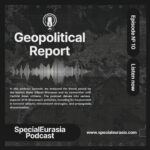
In this podcast episode, we analysed the threat posed by the Islamic State Wilayat Khorasan (IS-Khorasan) and its connection with Central Asian citizens . The podcast delves into various aspects of IS-Khorasan’s activities, including its involvement in terrorist attacks, recruitment strategies, and propaganda dissemination.
As we discussed in the previous podcast episode, the terrorist attack against the Crocus City Hall in Moscow underlined the threat that the IS-Khorasan represents in the entire Eurasia. The perpetrators, hailing from Tajikistan, claimed allegiance to the Islamic State.
IS-Khorasan has showed a broad scope of targets, including European states, Russia, China, Pakistan, and the Taliban-controlled Afghanistan. Despite not directly claiming responsibility for certain attacks, experts believe that IS-Khorasan’s involvement aligns with its overarching objectives, particularly in destabilising the region and advancing its agenda.
Formed around 2014, during the height of the original Islamic State’s power, IS-Khorasan aims to establish dominance in India, Pakistan, Afghanistan, and Central Asian countries. The group primarily comprises Central Asians and Afghans, representing non-Pashtun minority groups opposed to the Taliban.
Propaganda plays a crucial role in IS-Khorasan’s operations, with materials disseminated in multiple languages, including Tajik, Uzbek, Russian, Arabic, and English. These materials often glorify the contributions of militants from countries like Tajikistan, furthering recruitment efforts and fostering a sense of solidarity among sympathizers.
The podcast also highlights specific instances of IS-Khorasan’s terrorist activities, such as the Kabul airport bombing and attacks targeting Chinese businessmen and Iranian commemorations. Moreover, IS-Khorasan’s conflicts extend beyond the Taliban, with the group openly criticising negotiations with Western countries, Russia, and China.
Recent arrests in Istanbul further underscore the transnational nature of IS-Khorasan’s operations. Tajik and Kyrgyz citizens were apprehended on suspicion of planning a terrorist attack, highlighting the group’s reach and the ongoing efforts to combat its influence.
Additionally, the emergence of “Voice of Khorasan” magazine in Tajik languages signifies IS-Khorasan’s concerted efforts to propagate its ideology and critique regional governments. Tajikistan’s socio-political landscape, characterised by authoritarian rule and economic challenges, provides fertile ground for extremist messaging.
In conclusion, the latest podcast sheds light on the multifaceted threat posed by IS-Khorasan and its nexus with Central Asian citizens. As authorities and stakeholders grapple with counterterrorism measures, understanding the dynamics of this terrorist organization remains imperative in safeguarding regional stability and security.
Read also | Islamic State Short-Term Propaganda and the Lone-Wolves Threat to the West |
For further analyses and paid report on the IS-Khorasan and the terrorist threat in Eurasia, contact us at info@specialeurasia.com.



